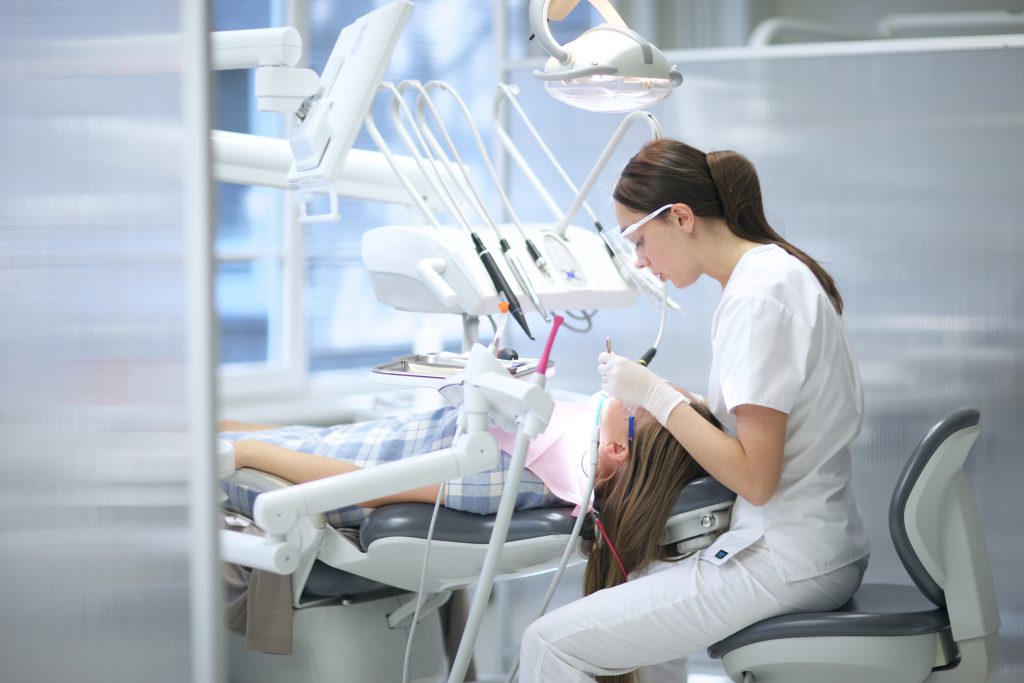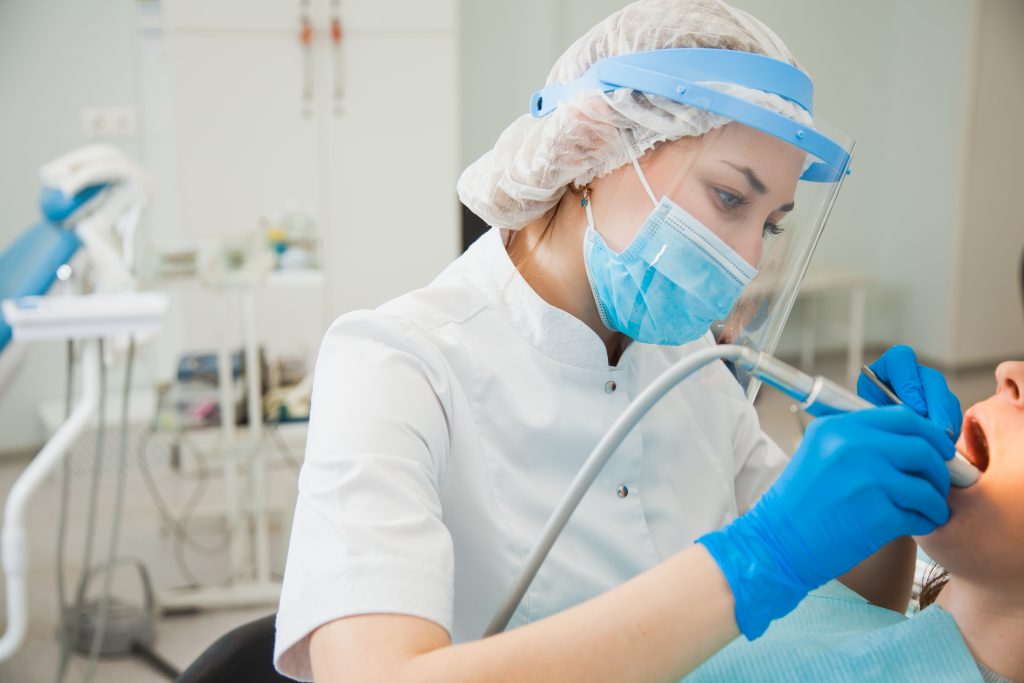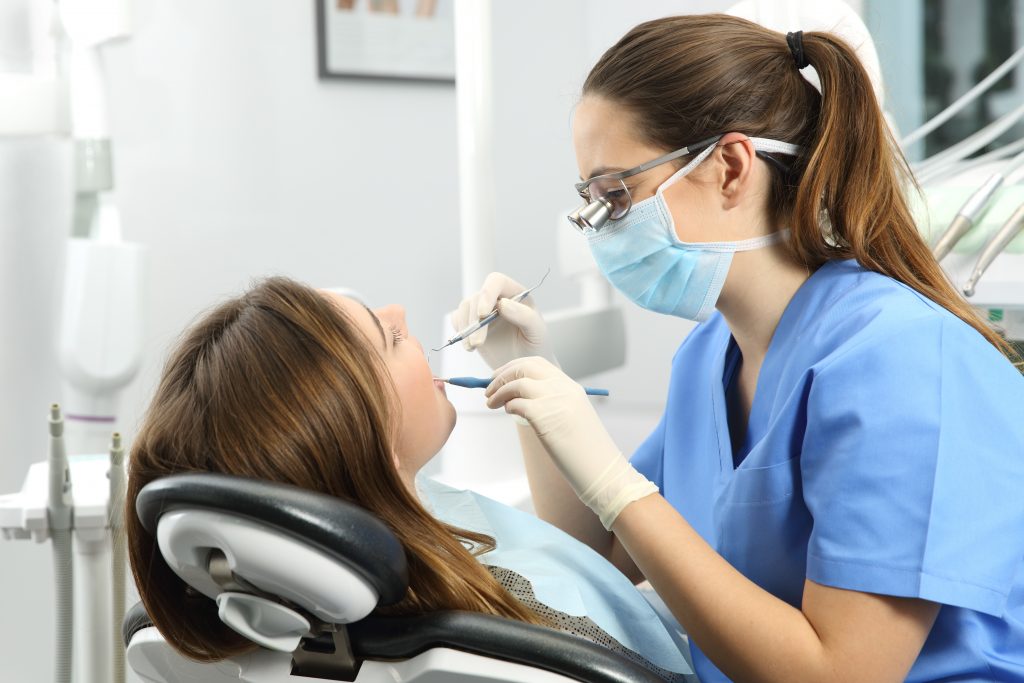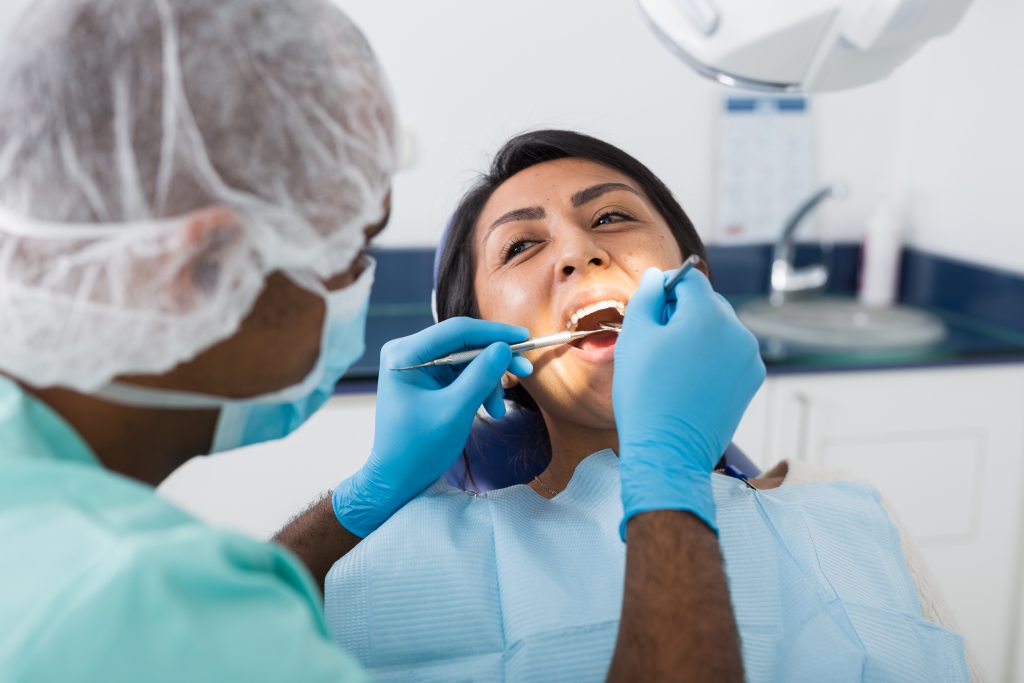
Dental hygienists are professionals with licenses. They help keep patients’ teeth clean and healthy through regular screenings. They are the glue between patients and dentists. They also enjoy personal benefits, such as:
- Flexible schedules
- Good salaries
- Rapid job growth
Becoming a dental hygienist is no small feat. You will need specific skills and a college degree. But what degree do you need to be a dental hygienist? Read on to find out more information on the career path of a dental hygienist.
Dental Hygienist Years of School
As an aspiring dental hygienist, you have many options. You must at least have an associate degree. These programs often take registered dental hygienist about three years to finish. But some students opt for a bachelor’s or master’s degree.
Bachelor’s programs take four years to complete. Master’s degree programs take another two years on top of the bachelor’s degree. But the most common pathway is the associate degree. You can get this degree from:
- Community colleges
- Technical schools
- Trade schools
- Universities
Remember, accreditation is important. You should only enroll in accredited programs, according to the American Dental Association. But don’t worry. There are plenty to choose from. The Commission on Dental Accreditation (CDA) accredits over 300 programs.
Best Major for Dental Hygienist
Associate Degree
The American Dental Association states that dentists spend years in dental school for their career. But dental hygienists only need a two-year associate degree. This degree comes from a dental hygienist program accredited by the CDA. For most entry-level dental hygiene positions, that’s all you need.
As a dental hygienist major with a high school diploma, you can explore many forms of general education. This means you will do more than sitting in classrooms. Your degree in dental hygiene will include hands-on learning. You will do lab work and clinical work to help develop skills.
Dental Hygienist Courses
Future coursework might include:
- Basic orofacial anatomy
- Dental health education
- Dental materials
- Dental radiology
- Dental health and sciences
- Dental surgery
- Infection and hazard control
- Nutrition and dental oral health
- Oral disease
- Periodontology
- Practice management
An associate’s degree in dental hygiene will take two or three years. If you do schoolwork full-time, it will take two years. Part-time schoolwork will take longer.
Associate’s degree programs often have small class sizes. They offer hands-on experience in the field. And the small classes make meeting instructors easier. This is important for fostering good relationships with faculty. Recommendations are the key to success in dental hygiene.
These degree in dental hygiene programs prepare you for the real world. They offer many benefits, like:
- Coursework
- Extensive training
- Labs
Bachelor’s Degree
Some dental hygienists choose the bachelor’s degree route. If you do this, you will study similar topics as associate degree students. You will also take courses that warrant a four-year degree.
But what major is dental hygiene in a four-year institution? What major is dentist hygienist approved? Here is a list of the best majors for dental hygienist applicants:
- Biology
- Dental assisting
- Dentistry
- Health sciences
There are many educational paths for dental hygienists. Most will choose bachelor’s degree programs or associate degree in dental assisting programs. But your continuing education can also include a master’s degree for this career.
Master’s Degree
Master’s degrees for aspiring dental hygienists give students extensive knowledge. They will prepare you to teach in dental hygiene programs. These programs are for licensed dental hygienists with bachelor’s degrees.
You can earn a master’s degree in an accredited dental hygiene program online or in-person. A dental hygiene program will cover many topics in dental hygiene. Dental hygiene courses can include:
- Clinical dental hygiene instruction
- Dental health theory
- Dental hygiene knowledge
- Dental hygiene practice
- Dental medicine
- Dental practice management
- General education methodology
- Research analysis
- Theory and practice of laboratory
Only get a master’s degree if you want to teach dental hygiene in dental schools or a dental hygiene program. To become a dental hygienist, an associate degree is all you need.
From Student to Dental Hygienist
The time it takes for you to become a dental hygienist depends on your degree. As you now know, you will only need an associate degree. That is the first and most important step toward this career. But some people pursue four-year degrees in dental hygiene.
As a dental hygiene major, you’ll take many classes. A degree in dental hygiene will prepare you to work in dental offices. Dental hygiene school makes sure you are ready to give patients great dental hygiene care. Some states require prospective dental hygienists to work under the guidance of a licensed dentist.
If you want to teach dental hygiene, you should get a bachelor’s degree. This is the lowest degree needed to teach for aspiring dental hygienists. But most teaching positions look for candidates with master’s degrees. In this case, your educational path will be longer than others. And a doctoral degree in dental hygiene will take eight years.
After Your Dental Hygienist Program
But general education isn’t the only step to become a dental hygienist. You know what to major in to become a dental hygienist. Now, let’s look at some next steps.
Imagine you’re finished with school and graduated from an accredited program. You got your degree from an accredited institution. Now what? First, you need to get a license to practice in your state.
In most states, this means passing regional clinical board exams. Each state has different rules for these exams. But no matter what state you live in, you must pass the NBDHE. That stands for the National Board Dental Hygiene Examination. You might need to take another exam, depending on your state. You need to pass the exams to work as a licensed dental hygienist.
Other Important Qualities for Dental Hygienists

As you know, the ideal dental hygienist or dental assistant has technical skills for teeth cleaning. But above all, a dental hygienist communicates with patients and colleagues. The best people in this field are compassionate with great interpersonal skills. They seek continuing education opportunities and believe knowledge is important to their career. But they also understand how to care for their patients and put them at ease. They are compassionate caregivers.
You also need strong attention to detail. Hygienists are responsible for office procedures. And you could be the first to spot signs of disease in patients. Some other important qualities for dental hygienists include:
Critical thinking skills
Dental hygienists must use critical thinking when examining patients and providing oral health. They must also synthesize instructions they get from dentists. Critical thinking is important when practicing oral hygiene on patients.
Communication skills
As mentioned, a dental hygienist receives instructions from dentists. Then, they share this information from patients. They also collect information from patients to share with dentists. On top of that, they instruct patients on oral care and hygienic lifestyles. To succeed at these tasks, you will need strong communication skills.
Detail orientation
Dental hygienists follow rules and protocols to help dentists treat patients. You cannot break or forget these rules. In some states, a dental hygienist works without a dentist’s supervision. In other states, they work under dentists’ guidance. Either way, being detail-oriented is crucial for good patient care.
Dexterity
Dental hygienists work in tight spaces in a small part of the body. In this field, you might work in children’s mouths, which are smaller. You will need fine motor skills to use dental tools. Hygienists work with their hands a lot. Because of this, you must have nimble fingers to enter this field.
Interpersonal skills
Like communication skills, interpersonal skills are crucial. Dental hygienists work with dentists and patients at close levels. They are empathetic and considerate in their work. Many patients are nervous at the dentist. It is the hygienist’s job to get them comfortable. Good interpersonal skills are important for this career.
Optimism
Good dental hygienists motivate and inspire their patients. Most people don’t like the dentist, so optimism is crucial. Dental hygienists need patients to feel positive about oral hygiene. This improves health outcomes for patients’ teeth and gums.
Problem-solving skills
Dental hygienists design care plans for patients’ oral health. Some cases are unique. You can’t always rely on textbooks for diagnoses. For those cases, you need good problem-solving skills. They will make you stand out.
Sense of humor
Dental hygienists enjoy their work. To cut stress, it’s important to have a good sense of humor. This puts patients at ease during stressful procedures. A balance of work and fun builds a positive environment for everyone.
A Dental Hygienist’s Work Environment
Dental hygienists must value safety in the workplace (dental office). They wear safety glasses, surgical masks, and gloves. They do this to protect themselves and patients from diseases.
When they take X-rays, they also follow many protocols. This protects them and patients from radiation.
But unlike these protocols, their work schedules are flexible. Most hygienists work part-time in a dental office. Some dentists hire dental hygienists or dental assistants to work a few days a week. This means that you might work for many dentists. But what does this work involve?
Daily Dental Hygienist Requirements and Duties
According to the U.S. Bureau of Labor Statistics (BLS), most dental hygienist duties include:
- Applying sealants and fluorides to protect teeth
- Assessing patients’ oral health and report findings to dentists
- Documenting patient care and treatment plans
- Educating patients about oral hygiene techniques
- Handling dental emergencies for patients
- Organizing school health programs and community outreach
- Removing tartar, stains, and plaque from teeth
- Scheduling appointments for dentists and patients
- Taking and developing dental x-rays
The tasks that hygienists do will vary, depending on your state. Some states let a dental hygienist perform restorative services. These hygienists have extra training and a new title: dental therapists. They have more schooling and training than a typical registered dental hygienist or dental assistants.
Dental therapists extract primary teeth and place temporary crowns. They also provide exams and fillings under dentists’ supervision. To become a dental therapist, you must have a license and degree with dental accreditation.
Most dental therapists work in dentist offices. But their extra training in dental hygiene science gives them more independence. Because of this, dental therapists can provide homebound care.
The work environment for most dental hygienists is positive. It is also safe and flexible for those with training.
Expected Salaries for Dental Hygienists
There are many advantages to a dental hygiene career. For dental hygiene jobs you only need an associate degree. Second, they earn a mean salary of $84,860/year according to the BLS. That is above the annual mean wage for all occupations, which is $61,900.
The highest 10% of dental hygienists earn around $107,640 a year. So, dental hygiene is a rewarding career.
But some factors impact the earnings potential for this occupation. The BLS reports these three top-paying industries for dental hygienists:
- Dentist offices
- Physician offices
- Government
Dentist offices have the highest levels of employment among dental hygienists. The annual mean wage for hygienists in dental offices is $85,110. That is a little higher than the occupation’s general mean wage.
High-Paying Locations for a Dental Hygienist
Geographic location also impacts potential earnings. According to the BLS, the top-paying states and dental hygienist salary (average) are as follows:
- Alaska: $113,770
- California: $111,580
- Washington: $111,430
- Oregon: $95,360
- New Jersey: $94,610
Some metropolitan areas also pay higher earnings for dental hygienists. You should consider living in one of these areas after getting your degree, if you want to earn good wages. These areas also have a good outlook for dental hygienist jobs.
- Santa Maria-Santa Barbara, CA: $131,200
- San Francisco-Oakland-Hayward, CA: $123,330
- San Jose-Sunnyvale-Santa Clara, CA: $122,370
- Santa Rosa, CA: $119,730
- Seattle-Tacoma-Bellevue, CA: $117,350
- Santa Cruz-Watsonville, CA: $116,900
- Napa, CA: $115,180
- Anchorage, AK: $114,920
- Vallejo-Fairfield, CA: $114,510
- Fairbanks, AK: $113,740
If metro areas aren’t for you, some non-metropolitan areas also offer high wages. According to the BLS, the five top-paying non-metro areas are:
- North Coast Region of California: $112,660
- North Valley-Northern Mountains Region of California: $112,300
- Alaska: $111,000
- Western Washington: $108,790
- Eastern Sierra-Mother Lode Region of California: $106,580
As you consider your dental hygienist education and obtain licensure, pay attention to these locations. Some offer high wages, but their costs of living are high. Some offer both high wages and low costs of living. Those are the locations you should consider.
Job Outlook for Dental Hygienists
The job outlook for dental hygienists is great. The Bureau of Labor Statistics predicts an 11% increase in job opportunities from 2021 to 2031. That is faster than the average for all occupations, which is 5%.
U.S. News & World Report ranks dental hygiene as number 35 in their list of 100 best jobs of 2023. The work of a dental hygienist is rewarding in many ways.
Make sure you study the job outlook for dental hygienists. The BLS reports an average of 16,300 openings for dental hygienists each year. This shows you what to expect for the next decade. These openings stem from these reasons:
- Growing number of baby boomers
- Recovery efforts following the COVID-19 recession
- Replacement of workers who change occupations
- Replacement of workers who retire
The COVID-19 recession started in early 2020. Because of this, employment growth for hygienists will rise with recovery efforts.
Demand will also increase with the rising baby boomer population. More people keep their original teeth than in previous generations.
Today, there is an increased effort to expand access to good oral hygiene. Many studies link general health to oral health. These studies drive demand for preventative hygiene services. They also increase the demand for routine dental services. In the end, more dental hygiene jobs will become available to prospective dental hygienists.
BDP Staff
May 2023
Related Resources:
- 5 Healthcare Degrees You Can Earn Online
- 20 Most Affordable Bachelor’s in Healthcare Administration Degrees Online
- 30 Best Online Bachelor’s in Health Sciences and Nutrition
- Ultimate Guide to Nursing & Healthcare Degrees and Careers
- What Is the Best Degree Path to Becoming a Dentist?


